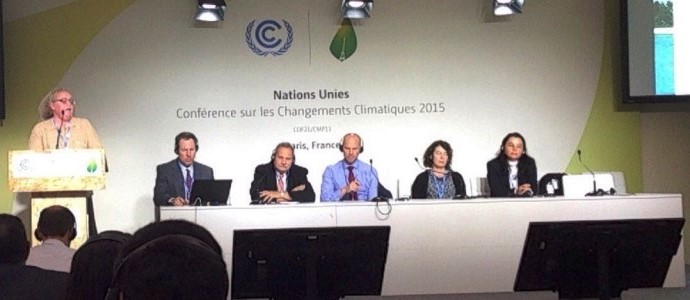Adaptation Fund COP21 Side Event Shows Value of Direct Access
Paris, France (December 4, 2015) – During the international climate change conference in Paris in late November to mid-December, the Adaptation Fund hosted a Side Event that drew a standing room-only crowd Dec. 4 as representatives from National Implementing Entities (NIEs) shared experiences with the accreditation and project development processes of the Fund’s pioneering Direct Access program.
Direct Access allows developing countries to access climate finance and develop projects directly through accredited NIEs while strengthening local and national capacity and expertise.
Lisa Andon, Deputy Executive Director of the NIE Micronesia Conservation Trust (MCT), spoke of how MCT was accredited in April 2015 under the Adaptation Fund Board’s new individualized alternative Streamlined Accreditation Process for smaller implementing entities. Through the process, the Adaptation Fund Panel and Board Secretariat provided guidance, best practices and a field visit as MCT strengthened its procurement procedures, organizational policies and institutional capacity to manage and implement adaptation projects, and prevent environmental and social risks. Following accreditation, MCT developed and submitted its first project proposal – to reduce community vulnerability to climate change – for review by the board in March 2016.
“We found this to be a very positive experience,” Andon said. “The board was very receptive to accommodating us as a smaller entity. We found this process has opened doors for other smaller NIEs to join the Fund.”
Mandy Barnett, Director of South Africa’s NIE, the South African National Biodiversity Institute (SANBI), praised the Fund’s Direct Access program for building institutional capacity, connecting diverse stakeholders and doing things differently to address climate change. Two South Africa projects are focused on building climate resilience in rural agricultural areas and empowering local community members with effective adaptation responses. “I’m a great proponent of Direct Access,” she said. “The projects are localized. They are fully endorsed by the local authorities. Local communities, as well, own the projects. It’s about making a difference on the ground. They are replicable, scalable and it’s also about catalyzing much bigger things. It enables local actors and can be transformational.
In Costa Rica, Marianella Feoli, Executive Director of the NIE Fundecooperación para el Desarrollo Sustenible, said Direct Access leads to improved institutional organization, involvement of local stakeholders and national agencies that catalyze community-focused, well-managed, impactful adaptation actions that can be multiplied. Sharing best practices between NIEs is also useful. An Adaptation Fund project in Costa Rica to reduce climate vulnerabilities on agriculture, water resources and coastlines is in its first year of implementation, but is already producing concrete results. For example, Vitalina Aguilar’s cattle farm was getting flooded every year until she implemented a drainage system and improved soil management that reduced losses. “Proposals are defined by the community itself,” Feoli said.
“The Adaptation Fund, through Fundecooperación, has been trying to put money into things that really have an impact and multiply the impact of the Fund,” advised Dr. Felipe Arauz, Costa Rica’s Minister of Agriculture. “It’s creating knowledge and targeting it to the right people.”
Rangasamy Amalorpavanathan, Deputy Managing Director of India’s NIE NABARD, which currently has five projects with the Adaptation Fund across a range of adaptation sectors and regions including fisheries and agriculture from the coasts to the Himalayas, said projects “reflect these multi-variable issues” while Direct Access promotes country ownership, builds on local understanding, effective stakeholder engagement and capacity building in project development and implementation.
The role of civil society in enhancing adaptation program effectiveness through project visits, information sharing, engaging with NGOs and vulnerable communities via dialogues, and climate action advocacy was also discussed, as Fazal Issa provided insights from ForumCC Tanzania.
“We heard today from a large range of projects, institutions, sizes and countries,” said Adaptation Fund Board Chairman Hans Olav Ibrekk. “It can take a little time to become accredited, but it’s important and well worth it to build capacity and ultimately achieve accreditation as everyone has attested today. It’s critical to develop country ownership, unlock local knowledge and pave the way for transformational change to address climate change sustainably.”
The Side Event was one of the Adaptation Fund’s featured activities during the Conference of the Parties 21st Session to the U.N. Framework Convention on Climate Change (COP21) held Nov. 30-Dec. 11, 2015 in Paris. The Fund also hosted a Contributor Dialogue, Multimedia Exhibit showcasing projects in action from diverse countries and sectors, and made appearances at the High Level Segment, Climate Change Studio, several global media outlets and bilateral meetings.
On Dec. 12, 196 countries agreed to adopt the historic COP21 Agreement, which recognizes an increased role for adaptation. The Adaptation Fund was also referenced in the decisions accompanying the new accord that “Recognizes that the Adaptation Fund may serve the Agreement, subject to relevant decisions by the Conference of the Parties serving as the Meeting of the Parties to the Kyoto Protocol and the Conference of the Parties serving as the Meeting of the Parties to the Paris Agreement.”
During COP21, the Fund also received new pledges totaling nearly US$75 million from Sweden, Germany, the Walloon region of Belgium and first-time donor Italy.
The Adaptation Fund has allocated US$331 million to 51 concrete adaptation projects in 45 countries, benefiting over 3.5 million people in sectors including coastal zone management, sustainable agriculture, food and water security, urban and rural development, ecosystem restoration and disaster risk reduction.
Communications Contact: Matthew Pueschel, mpueschel@adaptation-fund.org, or +1.202.473.6743



